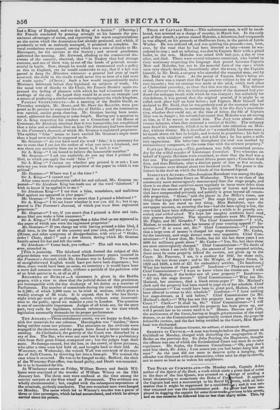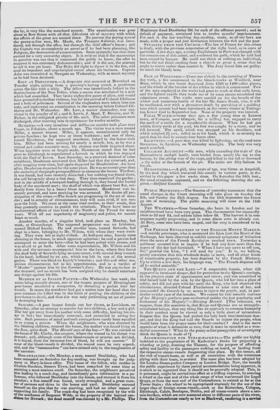THE DUKE or CUMBERLAND.—On Monday week, Captain Ache, author of
the Spirit of the Book, a work which made a great deal of noise in the days of the late Queen, was arrested on a' barge of sending a letter threatening to assassinate the Duke of Cu erland. It appears
the Captain had sent a manuscript to his Royal ness, with an int!. mation that it might be suppressed for a considers, i and.it was net. Cher returned nor was the consideration paid. An cer had leen em- ployed in dogging the captain for some threeweeks orevious to his arrest, and on one occasion he followed him no less, than ry miles. This, by the by, is very like the monchard system. The examination was gone about at Bow Street with all that ridiculotie air of mystery with which the affairs of the great are treated there. To prevent the prying eyes of the penny-a-line men, Mr. Maule, the Treasury Solicitor, was intro- duced, not through the office, but through the chief officer's house ; and the Captain was as completely au secret as if he had been planning, like Polignac, the destruction of a constitution. Sonic sympathy has thus been excited for a very unworthy object. It is evident that if the manuscript in question was one that it concerned the public to know, the offer to suppress it was extremely dishonourable; and if it did not, the attempt to sell it was yet baser. The Duke did right to throw it in the fire, and send its impudent and unprincipled owner about his business. Captain Ashe was committed to Newgate on Wednesday, with as much mystery as he had been detained.
RIOT AT BRENTFOILD.—A desperate riot occurred at Brentford on Tuesday night, arising from a post-boy's having struck a gentleman across the face with a whip. The fellow was immediately lodged in the Station-house of the New Police, when a rescue was attempted by a mob which had assembled. They broke eighty-five panes of glass, and would have proceeded to farther violence, but for the arrival of Colonel Clitheroe and a body of policemen. Several of the ringleaders tvere taken into cus- tody, and underwent an examination in the morning before Colonel Cli- theroe and Dr. Walmesley. Mr. Low, a master shoemaker, was con- victed in the penalty of 5/.; and S. Lewis, J. Mead, T. Derider, and W. Parker, in the mitigated penalty of 20s. each. The other prisoners were discharged, after entering into recognizances for twelve months. MURDERS.—A very atrocious and deliberate murder took place near Cupar, in Fifeshire, about a month ago. The victim was a man named Miller, a master weaver. Miller, it appears, manufactured only for private families : he kept two or three workmen ; and one of these, named Henderson, the supposed murderer, lodged in the house with him. Miller had been missing for nearly a month, but, as lie was a retired and rather eccentric man, his absence was little inquired about. When inquiries were at length made, Henderson stated that he had gone to Edinburgh to superintend a lawsuit in which he was engaged with the Earl of Leven. Last Saturday, to a renewed demand of some neighbour, Henderson answered that Miller had that day returned, and, after stopping some time, had again departed for Dunfermline. An hour after, Henderson departed for the same place. He was no sooner gone than the curiosityof thepeople promptedithem to examine the house. Thefloor, it was found, had been recently disturbed ; but nothing wasfound there, the soil being only about a foot deep. They then examined the garden ; and in the middle of a footpath leading through it, they found the buried body of the murdered man; the skull of which was almost beat flat, evi- dently from blows by a heavy blunt instrument. Henderson was in. gently pursued, and next morning he was arrested. He denies all par- ticipation of the crime.—The Scotch are progressing in the art of mur- der ; and in atrocity of circumstances, they will soon rival, if not sur- pass the Irish. We must at the same time confess, to their credit, that they generally contrive to punish the criminals. There have • been no undiscovered affairs of this kind to the North • of the Tweed for manys years. With all our superiority of magistracy and police, we cannot beast so much.
Another murder, of a singular kind; took place on Monday, last week, at Grunsthorpe. The supposed perpetrator was an Irishman, :named Michael Lundy. He and another man, named Sewards, had slept in a barn, belonging to Mr. Wilson, with whom they were work- ing. They were left at eight o'clock. At half-past nine, Lundy came shouting to the house, in much apparent agitation: he said a person had attempted to enter the barn—that he had been pelted with stones, and was afraid to go back. After some expostulation, Mr. Wilson and his wife and the servants accompanied him to the barn, where they found the dead body of Sewards lying on some straw, with several deep wounds in the head, inflicted by an axe, which was left in one of the mortal gashes. There was blood on Lundy's breeches ; and this and other sus- picious circumstances led to his apprehension, and to a verdict of "Murder" against him by the Coroner's Jury. He was son-in-law to the deceased, and no reason has been assigned why he should entertain any design against his life.
MURDER BY AN INSANE PAUPER.—On Wednesday last week, the nurse being casually absent, one of the insane paupers of Birmingham poor-house murdered a companion, by thrusting a pocket into her mouth. It seems the murderer had got a notion into her head that the poor creature she killed was in the habit of putting the children of the poor-house to death, and that she was only performing an act of justice iu destroying her.
SUICIDE.—A poor insane female cut her throat, at Lewisham, on Saturday, after an attempt to murder her two children, a boy and a girl. The boy got away from his mother with some difficulty, leaving his sis- ter in bed; but immediately returned, and succeeded in saving her also. Such presence of mind and such courage have rarely been equalled in so young a person. When the neighbours, who were alarmed by the bleeding children, entered the house, the mother was found lying on the floor, quite dead. The Herald says of the boy---" He was carried to the house of Mr. Clarke, the surgeon, where the wound in his throat was dressed ; and, although none of the blood-vessels or arteries are divided, it is feared, from the immense loss of blood, lie will not recover." If none of the blood-vessels is divided, the wound must be very superfi- cial, and the "immeuseloss " can have existed only iu the imagination of the narrator.
DOG-STEALING.-0II Monday, a man, named Doubleday, who had been remapded on Saturday for dog-stealing, was brought up for judg- ment at Mary-le-bone office. The house of the fellow, who resides in Chalton Gardens, Somers Town, had been remarked for some time as emitting a most noxious smell. On Saturday, the neighbours perceived him leading in a coach-dog, and immediately gave information to a po- liceman, who followed Doubleday into the house, and rescued it from his clutches; a fine mastiff was found, newly strangled, and a great num- ber of carcases and skins in the house and yard. Doubleday excused himself on the plea that he was starving, and had no other means of supporting his family. The coach-dog had been recognized by the wife of the coachman of Sergeant Wilde, as the property of the learned can- alidate for Newark; the dead mastiff was claimed by a Mr. Phillips. The
Magistrate fined Doubleday 201. for each of the offences proved ; and in default of payment, sentenced him to twelve months' imprisonment. For such is the law touching dog-stealing, made, as all our laws are made, with a proper and just dictinction between the rich and the poor
STEALING FROM THE CHURCH.—The law of France for this crime is death, with the previous amputation of the right hand, as in cases of parricide. A few days ago, a young Englishman in Paris was charged with the commission of this crime, and confessed his guilt, which he said had been caused by hunger. He could not think of robbing an individual, but he did not think stealing from a church so great a crime that he ought to starve rather than commit it. The Jury found him not guilty. So much for bloody laws.



























 Previous page
Previous page